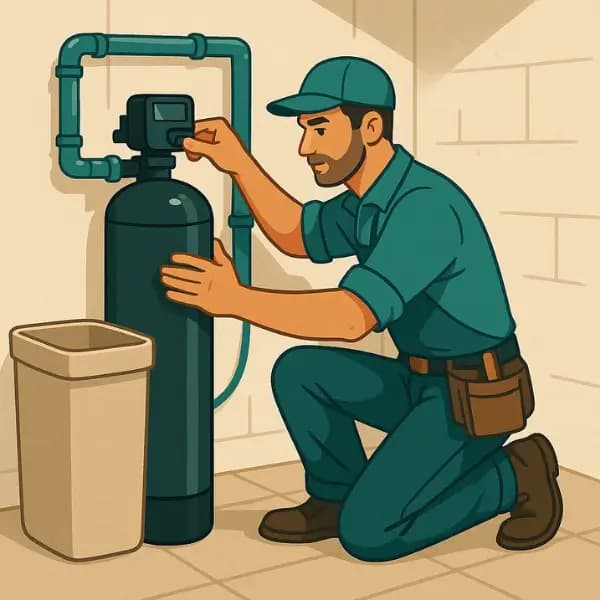

Saqib Hanif is the CEO and founder of Calculator Value. He builds calculators and educational content across sports, math, and science, and supports a limited set of construction-related calculators. Read full profile
Water Softener Installed Cost — Methodology & Accuracy
This calculator estimates installed cost for a residential water softener using current market pricing and typical professional installation practices.
DailyUse(gal) = 75 × HouseholdSizeDailyGrains = WaterHardness(gpg) × DailyUse(gal)CapacityBracket ∈ {32k, 48k, 64k}Equipment = BasePrice(type, CapacityBracket) × LocationFactorLabor = (InstallType === 'pro' ? LaborBase(type) × ComplexityFactor × LocationFactor : 0)Materials = (200 + (CapacityBracket === '64k' ? 100 : 0)) × LocationFactorSupplies = (Equipment + Labor + Materials) × 0.05Subtotal = Equipment + Labor + Materials + SuppliesTotal = Subtotal × 1.10While hard water is not harmful to health, it is not ideal for daily household use because it contains high levels of calcium and magnesium. It affects several things, such as soap not lathering well, causing white chalky buildup on faucets, and even damaging appliances and clogging pipes.
That’s what the water softener system is built for. It neutralizes or removes those excessive minerals, making the water softer, protecting your appliances and plumbing, and making daily usage easier.

But if you are a homeowner, one question you must be thinking about is: "How much will it cost you to install a water softener?" Don’t panic, our Water Softener Calculator is specifically designed to help you accurately estimate the total cost based on your water hardness, household size, system type, installation type, and location.
We cover in this guide:
A water softener calculator is a small but powerful online tool that helps homeowners estimate the total cost to install a water softener based on household size, water hardness, system type, and more. The calculator uses the latest standard market pricing and considers many factors to give you an accurate installation estimate
The logic behind our calculator is simple: it uses several key inputs to estimate the total installation cost:
Imagine, in your house there are a total of 4 people and your house is in a suburban area where water hardness is 15 gpg, and you want a salt-based system with professional installation.
Here is a step-by-step calculation:
$2,411Based on this example, the estimated total installation cost is around $2,411.
If you are experiencing scale buildup, stiff laundry, and cloudy dishes, then yes — you need a water softener to extend the lifespan of appliances and water heaters.
You will typically need to add salt every 4 to 6 weeks, depending on factors such as your water usage and the system size.
It mostly depends on your maintenance and other factors, but most systems can last 10 to 15 years.